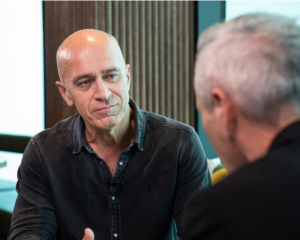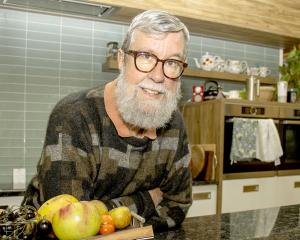A Christchurch paint company is selling products without the usual plethora of toxic chemicals and with an industry guarantee of durability twice that offered by most other brands, one of its founders says.
Natural Paint Co has been doubling its market coverage as Kiwis learn of the products' quality and indoor health benefits.
Founded by James Mount and Grace Glass seven years ago, the online-only company's products use only natural clays, pigments and resins - and fully details its ingredients.
Mount tells Nine to Noon the company has come along way since then, with its online store given a boost during the Covid-19 lockdown periods.
The pair embarked on their endeavour at the age of 22.
Mount says he fell into the paint industry after university as an interim job as he figured out what he wanted to do next. Glass was a nurse at the time.
Before the company was founded the pair had been making changes to be more conscious consumers and focus on issues like heath and sustainability.
“Being in the paint industry was a real eye-opener to how reliant it was on petro-chemicals and hadn’t really changed in the last 50 years. We’re seeing other industries make shifts to be more aware of the impact and utilise more sustainable materials and also the impact on consumers’ health,” he says.
He decided to look into ways of addressing that, creating products that were healthy for people, using sustainable materials but without compromising quality.
“There’s been a shift from some solvent-based products to water-based, which was a move in the right direction," he says. "But for us, when we did a deep dive into it, really it was actually quite alarming with how little has changed so far.
“One big motivator for us was when we looked at a big EPA (Environmental Protection Agency) study, which look at indoor air quality – this is throughout the world – and it found our indoor air is on average two-to-five times more toxic than outside.
"A freshly-painted room can have air that is up to 1000 times more polluted than the air outside and the resultant effects on people’s health can be quite alarming – from minor dizziness, asthma and allergies, sore throats and headaches to a larger range of acute and chronic health issues.”
Mount points to studies on the UK that found painters had a 20 percent increase in risk of cancers and 30 percent risk of bladder cancer. There is a lack of transparency in the paint industry on the thousands of chemicals used, many of which aren’t needed, he adds.
Others overseas had attempted to address these dangers, with varying degrees of success. Paints from Germany, which had stripped back many of these chemicals, he found lacked durability and didn’t wash well.
It became clear to the pair that if they were to be successful, they would need to achieve health benefits, prove sustainability, but also achieve product durability.
“We found some of New Zealand’s top paint chemists, one of them in the industry for 40 years and we tasked them with basically can we create a product which is as good as or better than what’s on the market, but we don’t want to use any ingredients that have any known health effects on humans or animals during or after painting. And we want to prioritise natural ingredients.”
Pooling this expertise and utilising new technologies on the market, they eventually succeeded to creating a new line of products. They stripped back cheap toxic chemicals, whiole including more expensive quality clays and chalks. They avoided chemical fillers and engineered a paint with high coverage.
“Texanol, which is pretty much in every water-based paint – that was more of a challenge, because we created a paint that doesn’t need one of the most popular paint dryers in the world. Texanol itself has reproductive toxicity,” he says.
They also removed the usual volatile organic compounds (VOCs), chemicals that release or “off-gas” into the indoor air we breathe.
Sourcing chemicals sustainably like titanium dioxide was also challenging. The company sourced this ingredient by making sure it was manufactured in a sustainable way, avoiding the cheaply-produced variety that causes more pollution.
“We’ve done everything to look at our supply chain, right from where we’re getting the products, the process that it goes through before coming to us and we have sourced what we can from New Zealand," he says.
They replaced cheaper synthetic components of paint with natural ingredients like titanium dioxide, and calcium bicarbonate, a chalk powder giving the paint body and fullness. Manuka oil was also used to act as a natural anti-bacterial element, while diatomaceous earth acted as a matting agent and further added to the body of the paint.
“One of our main resins is a plant resin that comes out of Europe and it’s made of natural gums, soya bean and a bit of linseed oil, rather than relying of a petrochemical acrylic resin,” he adds.
The company's products are industry certified for quality and offer impressive consumer guarantees.
“That’s where a lot of the science and technical side of it has been over the last seven years, constantly refining the product to make it as good as possible and we now have a 25 year interior guarantee, which is double what most other chemical paint brands will offer in the industry," he says.
“That’s been underwritten with our chemists and chemical manufacturing team, going through pretty rigorous pressure testing to make sure that it can hold up to the standards.
“We also have the Declare certification, which is through the Living Building Challenge and it’s basically a building certification that’s internationally recognised and looks at the real deep dive into the ingredients that are used, how they’re sourced and they have an intensive ‘red’ list of materials which are known to be quite nasty in paints that you’re not allowed to use. So that’s quite a useful list to compare our products to and we’re the only New Zealand company to have that.”
The company's business model includes a point of difference - its distribution is exclusively online. It created an online store in 2015 and the company's market share has shown 50 percent year on year.
Growth has been consumer led, while Covid-19 restrictions also accelerated growth in the online space.
“The biggest challenge has been market awareness I suppose, but when you have a good product and people are looking for it, and it gets into people’s hands, then the cool thing about Kiwis we like to tell other people when we have a really good experience when we find a product that really aligns with our values," he says.













